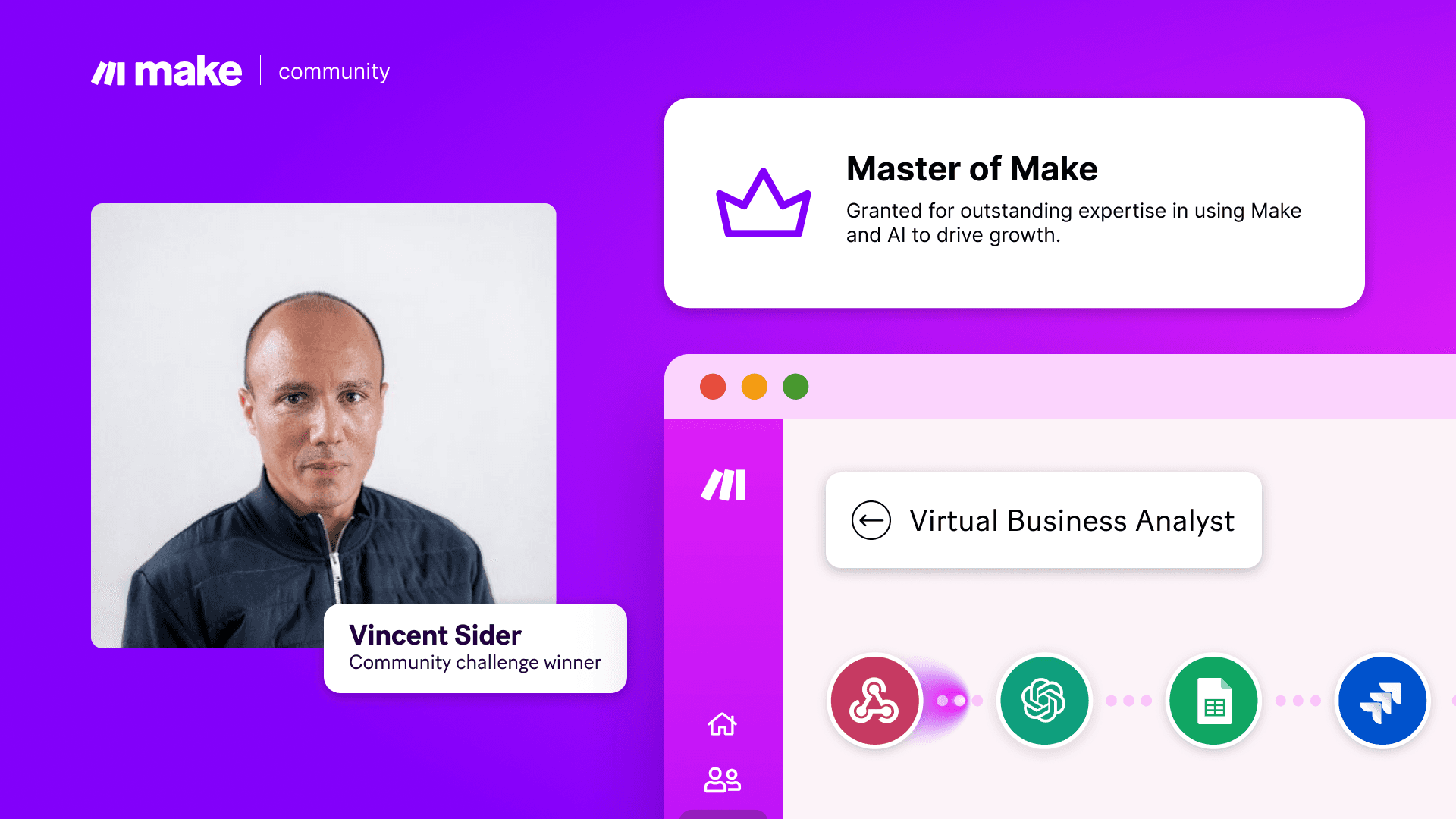Nov 25, 2025 | 4 minutes
Community challenge: Using Make’s AI Content Extractor to process 1,200+ messy purchase orders
Discover how Santiago Ruiz, a finalist of the Make AI Toolkit and Make AI Content Extractor-focused Community Challenge, built a scenario that uses AI to extract and structure purchase order data. His workflow enables automated processing of 1,200+ POs.

Industry: Professional Services - Business and Management Consulting
Use case: Order Fulfillment
Country: Colombia
Company size: 2-10 employees
Apps used: Make AI Toolkit, Make AI Content Extractor, Make AI Agents, Google Drive, OpenAI (ChatGPT, Sora, DALL-E, Whisper)
Over in the Make Community, we love setting challenges to see what makers dream up when given a prompt and some creative freedom. For our latest challenge, we invited users to build scenarios using the Make AI Toolkit, the Make AI Content Extractor, or both.
Santiago Ruiz, the Community Challenge contestant and founder of TheMagicHack, submitted an impressive solution to a real-world problem familiar to many businesses: processing large volumes of purchase orders.
His automation creation landed him a finalist spot in the challenge and showcased perfectly how powerful AI can be when paired with Make’s visual automation platform.
The challenge
One of Santiago’s clients receives around 150 purchase orders per month from 13 different customers.
Before automation, every purchase order had to be manually reviewed and entered into their internal systems
Key data points, like item lists, totals, requester info, and delivery details, were buried in documents
The layout and formatting were inconsistent
Manual entry slowed down operations and caused frequent mistakes
The process was time-consuming, error-prone, and hard to scale.
Santiago wanted to build a solution that could handle the mess and eliminate the manual work.
“Before this automation, someone had to manually enter every detail into the operations and logistics system. It wasn’t just slow – it was easy to make mistakes.
Santiago Ruiz, founder of TheMagicHack
The solution
Santiago built a scenario using Make’s AI modules that could:
Watch for new files in a Google Drive folder where purchase Orders are saved
Extract raw text from each document using the Make AI Content Extractor
Send the extracted text to OpenAI via the “Create a completion” module to structure the data consistently
Feed the structured output into a PostgreSQL database used by the client’s internal app to track purchase order status
Thanks to this setup, purchase orders are automatically processed the moment they’re received – regardless of layout or source.
“I used the AI Content Extractor to pull the text and OpenAI to structure it – everything else just flows from there.”
Santiago Ruiz, founder of TheMagicHack
Taking it further: Adding an AI Agent for validation
After seeing the initial success, Santiago enhanced the solution by adding an AI Agent that validates and cross-checks data before it reaches the database. The Agent verifies EAN (European Article Number) codes, quantities, and other critical information, applying business rules and automatically catching inconsistencies.
When corrections are needed, the Agent calls specialized tools – one to complete missing EAN data and another to submit validated information to the database. This self-correcting layer ensures only 100% verified go through, making the entire workflow fully autonomous.
The results
Since going live, the scenario has processed 1,800 purchase orders and counting.
Here’s what it’s delivered so far:
99.7% accuracy in data extraction
Zero manual input needed to process incoming purchase orders
Full purchase order history backfilled from January 2025
Structured data now flows directly into the client’s operations app
Sales, inventory, and logistics teams all have access to up-to-date purchase order data
Self-correcting validation that catches and fixes data issues before they enter the system
“Make is powerful, but also visual and intuitive. Once I understood how the modules worked, it all came together quickly.”
Santiago Ruiz, founder of TheMagicHack
Final thoughts
The Make Community Challenge was all about turning smart ideas into real, working solutions, and Santiago nailed it. His scenario didn’t just meet the brief; it proved how accessible and effective AI-powered automation can be.
Best of all, the results have inspired the client to automate even more.
“Now that they’ve seen what’s possible, the client is open to using AI in other parts of their operations.”
Santiago Ruiz, founder of TheMagicHack







